

Gaming Devices. Home. SuperBetter. ESP Game. Ian Bogost. Your roadmap for a healthy green life. The Magic Potion of Game Dynamics. Michael Wu, Ph.D. is Lithium's Principal Scientist of Analytics, digging into the complex dynamics of social interaction and group behavior in online communities and social networks.
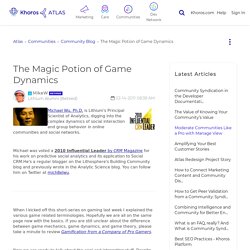
Michael was voted a 2010 Influential Leader by CRM Magazine for his work on predictive social analytics and its application to Social CRM.He's a regular blogger on the Lithosphere's Building Community blog and previously wrote in the Analytic Science blog. You can follow him on Twitter at mich8elwu. When I kicked off this short-series on gaming last week I explained the various game related terminologies.
Hopefully we are all on the same page now with the basics. Now we are ready to talk about the cool and interesting stuff. The Fogg Behavior Model The goal of game dynamics is to drive a user-desired behavior predictably. To understand game dynamics (and gaming mechanics), I will use a simple behavior model by Prof B. BJ Fogg's Behavior Model. Gamification Wiki. The Zappos Experience. Work.com - Social Performance Management from Salesforce.com. Gamification:Main - Coursera. Persuasive Games: Exploitationware.
In the meantime, there's another lesson to learn from Frank Luntz: don't let the opposition set the terms of the debate.

Instead, concoct better concepts with which to oppose them. In addition to his many verbal offensives, Luntz is also the architect of defensive phrases like "death tax," which invokes considerably more dissatisfaction than "estate tax. " The latter phrase sounds like it applies to the wealthy (which, as a matter of fact, it does), but Luntz managed to help win much more mainstream support for its possible repeal by removing resentment about its association with wealth and replacing that resentment with disgust at the idea of being taxed just for dying. And more recently, Luntz has advocated that Republicans opposing Obama's health care reform by calling it a "Washington takeover" that will force citizens to "stand in line" for care. Gamification in Enterprise Technology.
Does gamification create real business value? Part 2. Google I/O 2012 - Ignite. Jesse schell dice 2010. Smart Gamification: Seven Core Concepts for Creating Compelling Experiences. Smart games for a connected world.
Meaningful Play - coding conduct. Meaningful Play Meaningful Play.
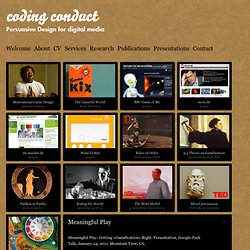
Getting »Gamification« Right. Presentation, Google Tech Talk, January 24, 2011, Mountain View, CA. Between promises of plain mind control and warnings of »pointsification«, the debate on »gamification« is deeply split. The Power of the Prize. They gave the world guns and butter -- specifically, the AK-47 and margarine.

They sent Charles Lindbergh's The Spirit of St. Louis from New York to Paris and Burt Rutan's SpaceShipOne almost 70 miles above the earth -- twice. They are innovation prizes -- think, X Prize -- and from their origins in the Age of Discovery in the 1500s, they've come roaring back to life in recent years, with foundations, governments, and businesses alike rewarding fantastic achievements. This spring alone, , , and MIT are expected to announce the winners of major business-idea competitions. David Perry: Are games better than life? Will Wright: Spore, birth of a game. Jesse Schell: When games invade real life. Seth Priebatsch: The game layer on top of the world. Hide&Seek - Inventing new kinds of play. Pawned. - coding conduct. Pawned.

Pawned. Gamification and Its Discontents. Presentation, Playful 2010, September 24, 2010, London, UK. Studies Find Reward Often No Motivator. Creativity and intrinsic interest diminish if task is done for gain By Alfie KohnSpecial to the Boston Globereprinted with permission of the author from the Monday 1987-01-19 Boston Globe In the laboratory, rats get Rice Krispies.
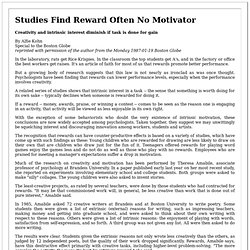
In the classroom the top students get A's, and in the factory or office the best workers get raises. It's an article of faith for most of us that rewards promote better performance. But a growing body of research suggests that this law is not nearly as ironclad as was once thought. A related series of studies shows that intrinsic interest in a task -- the sense that something is worth doing for its own sake -- typically declines when someone is rewarded for doing it. Gamification and Increased Productivity. Millennial Moms: Good Gaming at Home. Bio Samantha Skey Samantha Skey works with top consumer internet companies to build scalable business models amid rapid growth.

As Chief Revenue Officer for Recyclebank, a New York City-based clean web company, Skey built the company’s advertising and rewards strategy to serve thousands of brands. Recyclebank motivates and rewards green actionsamong mainstream consumers. Skey was Chief Marketing Officer at Passenger, Inc., a social software company providing online community for consumer brands, where she remains an advisor. Successful Gamification: Emotions, Not Badges. Gamification Summit 2012. Gamification:Experts - Coursera. Innovation Games. GameCraft - Gamification as a Service. Mention - Mention, LLC. Gamification Platform Matrix. Conventional wisdom has it that sales people love competition.
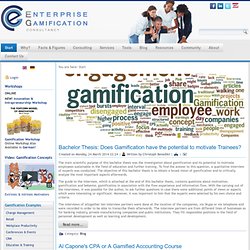
They want a challenge, beat their friends and colleagues, and be on top of the leaderboard. And sales managers constantly use carrots and competition, because this is what “motivates" sales agents. But is this true? We know that sales reps have to make money for the company. Depending on the product or service sold, the sales process and effort can vary significantly, from products and services which need a lot of explaining and have long sales cycles, to others that need nearly no explanations and sell quickly.
A Checklist for Evaluating Gamification Platforms. Conventional wisdom has it that sales people love competition.
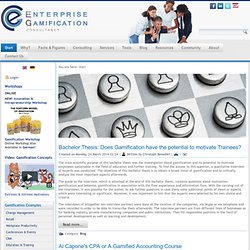
They want a challenge, beat their friends and colleagues, and be on top of the leaderboard. And sales managers constantly use carrots and competition, because this is what “motivates" sales agents. But is this true? We know that sales reps have to make money for the company. Depending on the product or service sold, the sales process and effort can vary significantly, from products and services which need a lot of explaining and have long sales cycles, to others that need nearly no explanations and sell quickly.
. #1 Competition is the opposite of collaboration. Coursera Gamification - Brazilian Group. Badges. File:Badge-diagram-2.2.jpg. Open Badges. The collected game design rants of Marc LeBlanc. XEODesign. Our Story XEODesign (pronounced zee-oh-design) is an award-winning firm that helps organizations increase engagement with play.
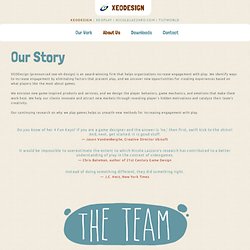
We identify ways to increase engagement by eliminating factors that prevent play, and we uncover new opportunities for creating experiences based on what players like the most about games. We envision new game-inspired products and services, and we design the player behaviors, game mechanics, and emotions that make them work best. Social Infrastructure. BigDoor: Gamified Loyalty and Rewards Programs. Gamification improves user engagement, employee productivity and customer loyalty. Games for Change is the leading global advocate for supporting and making games for social impact.
Gamesforchange.org.br. Serious Games Initiative. Coursera. The Fun Theory.